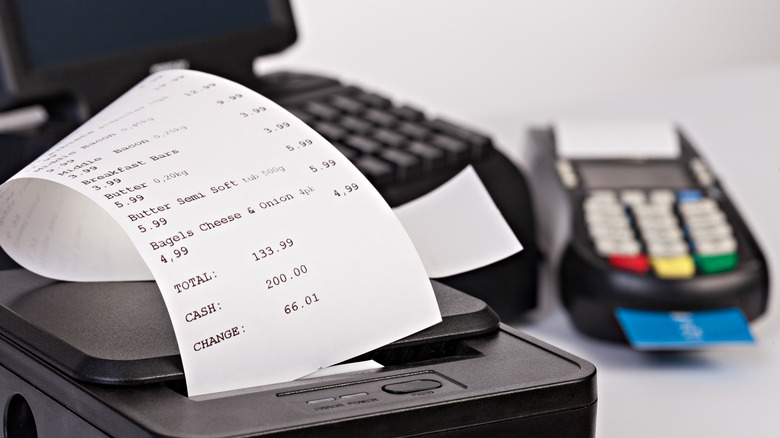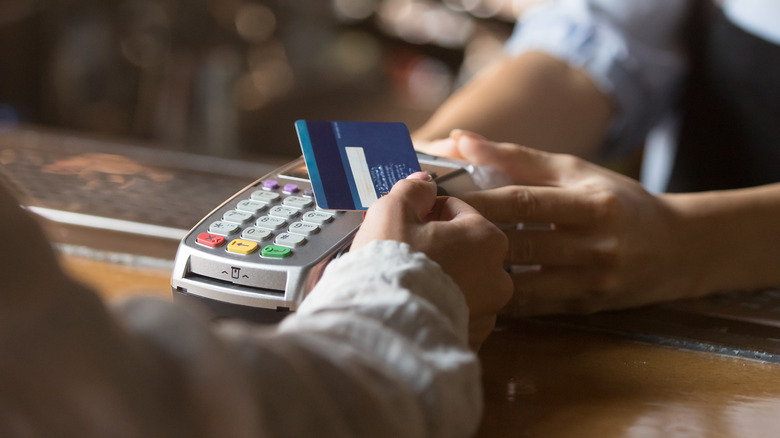Why Eating Out Is Becoming Even More Expensive
In some restaurants, they're known as "non-cash adjustments," per The Wall Street Journal. Others on Twitter say they could be labelled "LWgeSC" or "living wage surcharge." Some places have referred to these extra costs as an "employment wellness surcharge," per MinnPost, "kitchen appreciation," or even just plain "surcharge." But no matter how they're being labelled, there are extra charges being tacked onto your restaurant bill these days, and they appear to be here to stay.
Asking customers to pay extra for items that were once free — like tea or ice — isn't new. In fact, the tweet calling out a restaurant for its "LWgeSC" goes back to 2018. During the height of the coronavirus pandemic, a COVID-19 surcharge of around 5% was spotted in some restaurants as a way to help offset financial losses due to "rising food prices and limited restaurant capacity," per Delish.
But thanks to rising inflation and a tight labor market, along with higher credit card charges courtesy of Mastercard and Visa, The Wall Street Journal says many restauranteurs would rather slap on surcharges than raise the prices on individual menu items. As Boston seafood restaurant owner Kathy Siddell tells the business publication, "Our costs have increased exponentially, but there's just a certain amount that someone's going to pay for a lobster roll."
A restaurant's version of shrinkflation
The Wall Street Journal, which reported on the latest trend, calls these hidden charges a dining establishment's version of "shrinkflation," which we've seen plenty of in grocery stores since the cost of ingredients skyrocketed along with transport and labor fees. But some restaurants say charging these fees are the only way to recoup losses, especially for those who never really recovered from the coronavirus pandemic before they got hit with skyrocketing operational costs, which has grown to 17.5% over the last 12 months. "COVID-19 hit the foodservice industry hard. While recovery remains on track for 2024, consumers are feeling the pinch of inflation and reacting accordingly," CORE Foodservice president Travis King says, per UrnerBarry.
Troy Reding of Ally Restaurants explains that his firm began charging the fee as a way of being able to get health insurance for its workers; today it's a way to help cope with both inflation as well as the perils of operating in a tight labor market. "We'll see if this supply-chain mess straightens out a bit, see if the labor pool comes back at all," he told the WSJ. "If costs continue to escalate, part of our strategy is gonna be to figure out new and added benefits that we can add to retain the people we have and try and attract new people from other hospitality ventures."
'As shady as hidden fees'
If social media is to be believed, restaurants could soon see a backlash among irate customers who appear to be more willing to pay for higher food costs than navigate hidden charges. As one Twitter user put it: "Restaurant surcharges are as shady as hidden fees. If the surcharge is a fixed %, just increase all your prices by that much. Same with tips and tax. How is this not the same as a being quoted a price by a mechanic and then having more charges tacked on when it's time to pay??"
Another person on Twitter had a much more succinct response to the news of these charges potentially becoming permanent: "WTF, JUST RAISE PRICES!"
"I am not in favor of restaurant surcharges," A third added. "And there's a limit to how many places I can boycott for this policy. I'm a good tipper. Making customers share the business expenses of owners makes us partners in the business. I'm going to ask to inspect the books next time."
As a customer, there is something you can do about these hidden costs. Check your bill carefully, and if you spot something you're not comfortable with, let the cashier know. You could either try to get it waived, or decide it is a fee worth paying after all.


